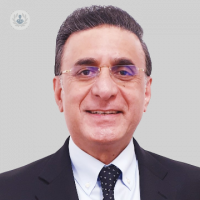Benign prostatic enlargement: what to know
Written in association with:Benign prostatic enlargement (BPE), also known as benign prostatic hyperplasia (BPH), is a common condition in older men characterised by the non-cancerous enlargement of the prostate gland, which can lead to difficulties with urination. The prostate gland is located below the bladder and surrounds the urethra, the tube through which urine exits the body.
As men age, hormonal changes can cause the prostate to grow, compressing the urethra and leading to urinary issues. Although the exact cause of BPE is not fully understood, it is believed to be linked to hormonal changes, particularly an increase in dihydrotestosterone (DHT), a hormone associated with prostate growth. On hand to provide more detail about this is renowned senior consultant urologist, Mr Haider Syed.

What are the associated symptoms?
Symptoms of BPE can vary in severity and often include frequent urination, especially at night (nocturia); a sudden and strong urge to urinate; a slow or weak urinary stream; difficulty starting urination or straining to urinate; a feeling that the bladder is not completely empty after urination; and post-urination dribbling. These symptoms can significantly impact the quality of life and, if untreated, may lead to complications such as urinary tract infections, bladder stones, and kidney damage.
How is BPE diagnosed and treated?
Diagnosis of BPE usually involves a combination of medical history, physical examination, and diagnostic tests. A digital rectal exam (DRE) allows a doctor to assess the size of the prostate. Additional tests may include urine tests, blood tests (such as PSA levels), ultrasound, and urodynamic tests to evaluate bladder function.
Treatment for BPE depends on the severity of symptoms and their impact on daily life. Options range from lifestyle changes, such as reducing fluid intake before bedtime, limiting caffeine and alcohol, and regular exercise, to medications like alpha-blockers, which relax the muscles of the prostate and bladder neck to improve urine flow, and 5-alpha-reductase inhibitors, which shrink the prostate by blocking DHT production.
Minimally invasive procedures, including transurethral microwave therapy (TUMT) and transurethral needle ablation (TUNA), use heat to reduce prostate size. In more severe cases, surgical options such as transurethral resection of the prostate (TURP) or laser therapy may be necessary to remove excess prostate tissue.


